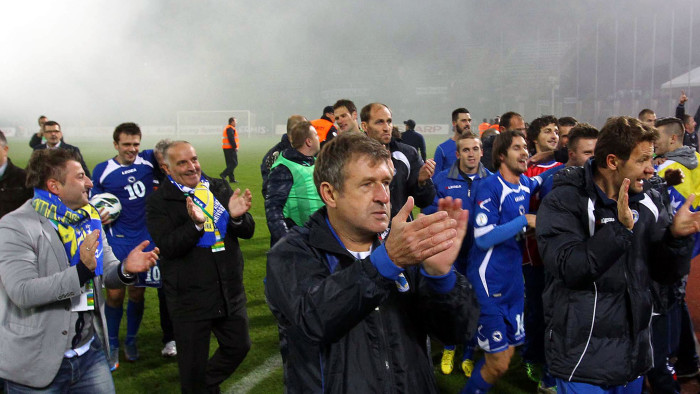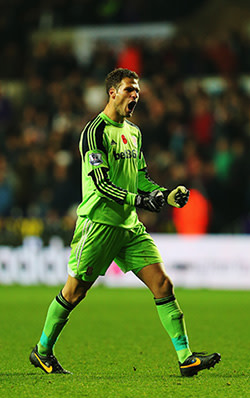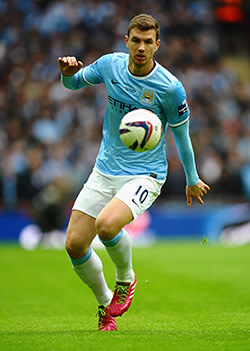Bosnia & Herzegovina’s World Cup debut

Simply sign up to the Life & Arts myFT Digest -- delivered directly to your inbox.
In this café, the stocky middle-aged man with a crinkly smile and a Balkan accent is just another local. Safet Susic, Bosnia’s coach, is on home ground here in Saint-Germain-en-Laye, a pleasant commuter town west of Paris. “I have been here over 30 years,” he explains. When he arrived, as a midfield playmaker from Yugoslavia, the town was handy for Paris St-Germain’s training ground. He never went home again. Bosnia’s best ever footballer has become yet another Bosnian in the diaspora. That makes him an appropriate coach for his country. His team, like Bosnia itself, is the product of war and emigration.
Bosnia will be the only country in Brazil playing its first World Cup. “When we qualified, it was unforgettable,” recalls Susic over tea, in French that after all these years remains mediocre. “We arrived at [Sarajevo] airport at 2am, where there were 5,000 people, then 50,000 in the centre of town at 3am. It’s something you experience once in your life.”
WORLD CUP SPECIAL

Italy
Exclusive interview with top player Andrea Pirlo
Spain
How the reigning champions plan to do it again
Argentina
Can Messi ‘the Messiah’ live up to his name?
England
Why are they so bad
at penalties?
Cameroon
The team with ‘hemle’ and Samuel Eto’o on their side
Brazil
One man, a country’s hopes: superstar Neymar
United States
How the US learnt to
love soccer
Colombia
Can the team affect presidential elections?
My friend Pelé
An ‘imperialist Yankee’ reminisces
How to save a penalty
Dutch goalkeeper
Michel Vorm explains
Did Bosnia’s recent memory of the Yugoslav wars – Sarajevo was besieged from 1992 to 1996 – add to the emotions? “War? It’s 20 years ago. I don’t want to talk about that much. I wasn’t there, I was in France. It was hard, to find solutions for family, friends, who were there. It was very hard, to wait to hear every day that someone you knew very well has been killed.” But he won’t use the war as a cheap storyline for a football tournament.
Still, the war shaped his players. About 800,000 Bosnians, the vast majority of them Muslims, fled the former Yugoslavia for the west during the fighting. They landed up in Germany, Austria, Sweden and everywhere else from Australia to the US. Today, some of the frightened little boys they brought with them are international footballers.

Almost all Susic’s players grew up outside Bosnia. Stoke City’s goalkeeper Asmir Begovic, who left Bosnia aged four, fetched up in Edmonton, Canada. The striker Vedad Ibisevic became a star of high- school soccer in St Louis. Mid-fielder Miralem Pjanic grew up in Luxembourg. Another midfielder, Haris Medunjanin, arrived in the Netherlands as a child refugee, and won two youth European championships in Dutch colours. If only Bosnia could also have fielded Zlatan Ibrahimovic, son of a Bosnian Muslim father. But the boy from Malmö, Sweden now captains the Swedish team. Instead, Bosnia’s attack is led by Edin Dzeko of Manchester City, a rare player who didn’t flee during the war; he left only as a 19-year-old professional footballer.
“If there had been no war, they would have had the best life in Bosnia,” muses Susic.
Do all his players speak “Bosnian” (the new name for the local variant of what was once called “Serbo-Croat”)? “All of them,” says Susic. “Some with an accent, if they were born in Germany. Begovic didn’t speak it well at the start but he does speak it.” Does Susic mind if players speak English or German to each other? “Not at all. I have quite a few players who speak four or five languages: Pjanic, Ibisevic, [Zvjezdan] Misimovic. They are very intelligent boys.” Does he feel affection for his players? “Of course. I’m not someone who shows that, but I like them. We’ve done something exceptional together. It will stay in my memory.”
He says some of his players play in the styles of their adopted countries. “Luckily they had good facilities to train. Especially those formed in Germany have taken on some of the German mentality: extremely serious, disciplined, ambitious.” And yet, he adds, this diaspora side isn’t so different from the Yugoslav national teams in which he starred in the 1980s. Back then, the skilled Yugoslavs were nicknamed “the Brazilians of Europe”. Susic says, “We’ve kept the game of the ex-Yugoslavs: the players are all very good technically. We have some really exceptional players: Begovic, Pjanic, Dzeko, and others – but those three could play for any team in the world.
“Our weakness is our mentality, like always” – just like in Yugoslav days, he means. “We lose rigour in the match, when we relax. We don’t manage to surpass ourselves. When we hit a difficult moment, we let our heads drop – not like German or Italian teams. That’s how we are.”
In fact, he remarks, Bosnia plays very like its neighbour Croatia, which will also be at the World Cup. No wonder: Croatia has long recruited players among Bosnian Croats, and Bosnia regularly fields ethnic Croats and Serbs.
Susic says he doesn’t care about a player’s ethnicity: “It’s not a problem for me.” Indeed, his team is arguably Bosnia’s only functioning multi-ethnic institution, after the European football authority Uefa forced squabbling soccer officials from different ethnic groups to come together. Foreign observers often eulogise the side as a model for the Bosnian state.
However, Susic rejects the facile notion of football as a solution to Bosnia’s problems. Anyway, he cannot pretend his team is truly multi-ethnic. “My best players are all Bosniaks: Muslims,” he shrugs. “It might be better if the team were more mixed. But the only thing that counts for me is to pick the best players. In some matches we’ve had 11 Bosniaks, no Serbs, no Croats. But that’s the way it is.”
I point out that his playmaker, Misimovic, is an ethnic Serb born in Germany. “I can’t say ‘Serb’,” Susic corrects me. “He’s Bosnian. He’s Orthodox [meaning an Orthodox Christian]. For me, a Serb is in Serbia, a Croat in Croatia. But he’s one of the most appreciated players in Bosnia.” Unfortunately, he adds, Misimovic now plays for Guizhou Renhe in the weak Chinese league. “That’s a problem. He’s 32, he was operated on recently. Will he be 100 per cent in the World Cup? If he is, he is very important to our team. He has put on a few kilos. But I hope that after a month’s work, he’ll be in shape.”

Even Bosnia’s fans in Brazil will mostly be Bosniaks from the diaspora. The BH Fanaticos fan group, created by Bosnian Swedes, now counts members from around the world. Velid Imamovic, an official at Bosnia’s football federation, told me in Sarajevo: “Some of them don’t know a lot about this country. I told them, ‘It’s easy to support your country by remote control. If you really want to help your country, come here and live with us.’” The relationship between Bosnians in Bosnia and those outside can be tense. A cruel Sarajevo joke during the siege went: “What’s the difference between a smart Bosnian and a dumb Bosnian? The smart one phones the dumb one every day. From abroad.” The divide has remained intact since the war, as the diaspora has generally prospered while Bosnians in poor Bosnia haven’t, says Özgür Dirim Özkan, a Turkish anthropologist who studies Bosnian football.
Very few ethnic Serbs or Croats in Bosnia will support the overwhelmingly Bosniak team, adds Özkan. I ask Susic whether people in other former Yugoslav republics will be supporting Bosnia. “Hmmm,” he ponders. “I have friends in Belgrade who call me and say they’re supporting us. I think you’ll see quite a few supporters all over ex-Yugoslavia.” Regrettably, they won’t be able to sing along with the Bosnian anthem before matches. The anthem has no words, because the country’s ethnic Muslim, Serb and Croat politicians couldn’t agree on any. As Susic contemplates the political squabbles, he sighs: “I don’t have an answer. The war ended 20 years ago but still there are the same questions: who is Bosnian, Serb, Croat? When we don’t have that anymore, we’ll have made progress.”
Ethnicity might just be forgotten in Rio on June 15 when Bosnia make their debut in a World Cup against Lionel Messi’s Argentina. Susic marvels: “We’re playing the world’s best team, in a mythical stadium, the Maracanã. There will be 80,000 spectators, perhaps 75,000 of them Argentines. We’ll practically be playing in Argentina. We don’t expect much from that match. It’s more against Nigeria and Iran that we’ll be playing for our destiny.” He warns that Bosnia won’t attack in Brazil as they did in the qualifiers: “We’ll have to change. Against Argentina, we’ll sacrifice a striker and an attacking midfielder.”
What is Bosnia’s target? “Our people are demanding. They expect us to reach the second round. If we don’t they will be very disappointed.” If Bosnia finish second in their group and France top theirs, Susic’s two nations will meet in the second round. “For me that would be a beautiful match. J’aime beaucoup la France. I got a French passport in 1987. I got a Bosnian one just six months ago.”
When we say goodbye, he insists on paying the bill. “You’re in my place,” he says. Here’s another Bosnian at home far from home.
——————————————-
Simon Kuper is an FT columnist based in Paris
To comment on this article please post below, or email magazineletters@ft.com
Comments